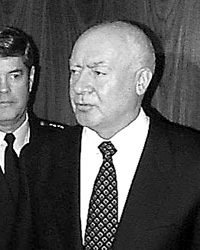Igor Rodionov
| Igor Rodionov | |
|---|---|

Rodinov at a Pentagon briefing while serving as Russian Minister of Defence
|
|
| Minister of Defence | |
|
In office 17 July 1996 – 22 May 1997 |
|
| President | Boris Yeltsin |
| Prime Minister | Viktor Chernomyrdin |
| Preceded by | Mikhail Kolesnikov (acting) |
| Succeeded by | Igor Sergeyev |
| Personal details | |
| Born |
Igor Nikolayevich Rodionov Игорь Николаевич Родионов 1 December 1936 Kurakino Village, Penza Oblast, Russian SFSR, USSR |
| Died | 19 December 2014 (aged 78) Moscow, Russia |
| Awards |
Order of the Red Banner Order of the Red Star (2) Order for Service to the Homeland in the Armed Forces of the USSR, 2nd class and 3rd class |
| Military service | |
| Allegiance |
|
| Service/branch | Russian Ground Forces |
| Years of service | 1954–1997 |
| Rank | General of the Army |
| Unit | 40th Army (Soviet Union) |
| Commands |
Ministry of Defense of the Russian Federation Transcaucasian Military District |
| Battles/wars | Soviet War in Afghanistan |
Igor Nikolayevich Rodionov (Russian: Игорь Николаевич Родионов; 1 December 1936 – 19 December 2014) was a Russian general and Duma deputy. He is best known as a hardline politician, and for his service heading the Defence Ministry of the Russian Federation.
Rodionov served as a Soviet military officer in Germany, Czechoslovakia, the Russian Far East and several other areas around the world. Then-Major Rodionov commanded a motorized rifle regiment in the famed 24th Motorized Rifle Division (the "Iron Division") in the Carpathian Military District from 1970–1973, and later commanded the 17th Motor Rifle Division in the same District. He commanded the 5th Army in the Far East Military District from 1983–85 and then the key 40th Army in Afghanistan in 1985–1986. He held the post of First Deputy Chief Commander of the Moscow Military District from 1986 until 1988, when Colonel General Rodionov was appointed Commander of the Transcaucasus Military District.
Rodionov was held responsible for the violent repression of demonstrations in April 1989 during the April 9 protests in Tbilisi, during which 19 people were killed and hundreds injured. He was removed from his post and assigned to the General Staff Academy, which was one of the traditional Soviet dumping grounds for those who fell out of favor. However, Based on Rodionov’s politics, personality, career roster, and consistent opposition to the use of army troops in the city, there is good reason to believe that he served as a scapegoat for the events. The Sobchak commission investigating the tragedy established the orders to clear the demonstrators originated from Defence Minister Yazov, at the request of Republican level Communist Party officials. Yazov and Rodionov were personal enemies and laying the blame on him was convenient for the Politburo generally and Yazov personally. The deaths themselves were the result of the units involved treating it as "military operation" which "was not corrected in accordance with the actual situation" (the number of protesters present far exceeded what was expected). The soldiers deployed, especially the VDV unit, where not equipped or trained for controlling civil disturbances and the operation was poorly planned.
...
Wikipedia
